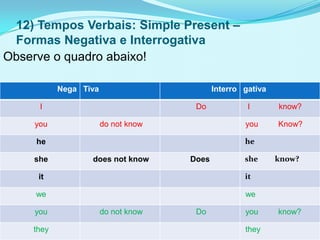
Simple present - formas negativa e interrogativa
- 1. 12) Tempos Verbais: Simple Present – Formas Negativa e Interrogativa Observe o quadro abaixo! Nega Tiva Interro gativa I Do I know? you do not know you Know? he he she does not know Does she know? it it we we you do not know Do you know? they they
- 2. Formas negativas: 1) Uso do verbo auxiliar “do + not” antes da forma básica (infinitivo sem to) do verbo principal, para I, you we, they. 2) Uso do verbo auxiliar “ does + not ” para he, she, 3) Os auxiliares são geralmente contraídos com not, formando don’t ou doesn’t. I go to school by bus. I don’t go to school by subway. (Eu vou à escola de ônibus. Eu não vou à escola de metrô.) She plays the piano. She doesn’t play the guitar. (Ela toca piano. Ela não toca violão.)
- 3. Forma interrogativa: Usam-se do (I, you, we, they) e does (he, she, it ) no início da pergunta, antes do sujeito, e o verbo principal fica no infinitivo sem TO. Do you go to school by bus? Does he go by subway? (Você vai à escola de ônibus? Ele vai de metrô? Do they play the piano? Does she play the guitar? (Eles tocam piano? Ela toca guitarra?) BobCheck: Do e Does enquanto auxiliares do presente simples NÃO tem tradução e NÃO permitem flexão verbal.
- 4. Complete com do, does, don’t ou doesn’t. 1. ___________ you wear a hat when you go to the beach? 2. ___________the Amazon Forest have a future? 3. Consumers __________ accept genetically modified foods. 4. _________ you like chocolate? ________ apiece of chocolate satisfy you or isn’t it just enough? 5. ________ you have a list of “little joys”? 6. Fishermen, prostitutes, sailors, and tramps _________ need any pompous philosophy in order to live their lives. 7. An optimist ___________ ignore the dark side of thing, but he chooses the other side.
- 5. Complete com do, does, don’t ou doesn’t. 1. Do you wear a hat when you go to the beach? 2. Does the Amazon Forest have a future? 3. Consumers don’t accept genetically modified foods. 4. Do you like chocolate? Does a piece of chocolate satisfy you or isn’t it just enough? 5. Do you have a list of “little joys”? 6. Fishermen, prostitutes, sailors, and tramps don’t need any pompous philosophy in order to live their lives. 7. An optimist doesn’t ignore the dark side of thing, but he chooses the other side.